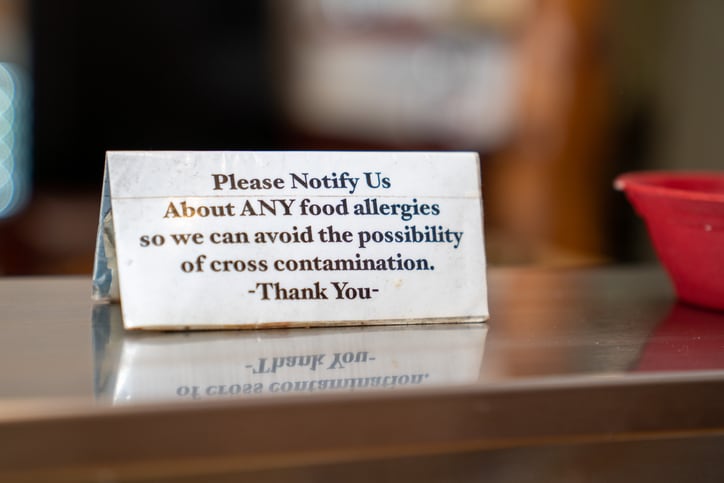In its first food allergy report, Hospitality Allergen Support UK (HASUK) has called for improved knowledge in the hospitality sector on allergens and the need to include near-miss reporting as a standard within Food Safety Management Systems (FSMS) across the hospitality sector.
Today, 44% of British adults suffer from at least one allergy, prompting HASUK to undertake a report to understand how the food and hospitality sectors cater to adults with allergens. Up to a fifth of patients with allergies struggle daily with the fear of a possible asthma attack, anaphylactic shock, or even death from an allergic reaction, Allergy UK state.
Natasha’s law
In October 2021, Natasha’s Law was introduced to require businesses to declare a complete list of ingredients on food that is pre-packaged for direct sale (PPDS), wherever it is sold, following the tragic death of Natasha Ednan-Laperouse after consuming food at Pret a Manger.
“We were shocked to discover that Pret a Manger had received feedback from several families who reported that they were unaware that sesame was used in the dough of the baguettes,” Jacqui McPeake, Founder and Director of JACS, told FoodNavigator.
At the time, Pret did not have a procedure to capture this type of feedback. “We believe if they had investigated the reports, they may have changed the vital information provided to customers,” said McPeake. At the inquest of Natasha Ednan-Laperouse’s death, the coroner relayed that if Pret had logged and monitored customer allergic reactions and fed this back to their head office, then actions could have been in place to prevent Natasha’s tragic death, HASUK said.
Despite the law’s implementation, confusion and a lack of understanding remains, the Journal of Trading Standards reported in 2023, signalling the need for greater awareness and action.
Investigating near misses
In food and hospitality, near-miss reporting is as an event or situation that could have resulted in injury, damage or loss but did not do so due to chance, corrective action and timely intervention.
“Near-miss incidents may occur due to lack of confidence and knowledge of how to manage allergen-free requests,” said McPeake. Training across the industry is inconsistent, and staff turnover makes it challenging to monitor staff.
Some leading UK catering and hospitality businesses have been proactive in protecting their food-hypersensitive guests for at least two decades, and many have well-established, tried and tested risk assessment, management and communication controls in place, which are continuously monitored, validated and verified, Allergy Action’s Dr Hazel Gowland relayed.
Active training programmes embedded into everyday work practices under supervision also support these. For such operations, a ‘near miss’ could be either on-compliance with a previously established control or a new risk, previously unrecognised. In the second instance, it often involves an unanticipated change in behaviour by staff or guests or the management or communication of food information.
“In such operations, it is relatively easy to undertake root cause analysis to identify what happened, how any non-compliance took place and what corrective action may be effective,” Dr Hazel Gowland, food allergy expert researcher, and lecturer from Allergy Action, told FoodNavigator.
Understanding near-misses in the UK
HASUK worked with a final-year hospitality student from Greenwich University who created a survey for the hospitality industry. “Despite sharing widely on social media, the number of responses received from the sector was disappointing,” McPeake confirms.
However, HAFSUK states it received a significantly better response to its Food Hypersensitive Consumer (FHS) survey, highlighting there is a lack of consistency across the industry when managing near-miss incidents. Concerns exist about food allergens outside the top 14 allergens, the report found, as respondents said that staff often assumed it was not a serious allergy.
Over a third (35%) of consumer survey participants said they had been made ill by eating out, a sign that businesses are putting themselves at risk from lawsuits and that staff training in communication and processes needs to be improved. Myths also prevail, such as “heat kills gluten”, which is untrue and highlights poor allergy and staff training.
Almost a quarter of respondents had to indicate an allergy issue to staff (24%), and others felt that customer service was flippant and uncaring when highlighting a near miss or allergy issue (23%).
Of those asked in the hospitality sector, 59% said they were not confident in providing allergy information to customers, highlighting a gap in knowledge exposing food service and allergy customers to risks.
Near-misses as part of the Food Safety Management procedures
“There is still a lack of understanding about allergens and messages such as ‘a little won’t do any harm’ and not listening to the customers’ requests can cause issues,” added McPeake.
“Don’t Dismiss a Near Miss!” is the message HASUK wants to convey. Along with adopting the slogan of recognising, reporting, and reviewing near-miss Incidents, HASUK also encourages a “No Blame Culture” to encourage staff in the industry to report incidents and review procedures to minimise the risk of further incidents. “Within an individual operation, a culture of confident transparency and ‘no blame’ will enable staff and supervisors to challenge potential risks and identify new controls,” Gowland agreed.
The food and hospitality industry can clamp down on these near misses by recognising and identifying what constitutes a ‘near miss’ from a business perspective.
“Including all ‘near misses’ from the smallest in-house spillage, allergen left off an allergen matrix, dirty utensils re-used to customer complaints and customer reactions and incidents,” added Gowland, is another step. Ensuring all formal and informal checks, audits and staff training are updated to address new practices is also prominent.
“Reporting all ‘near misses’ throughout the business to ensure that lessons learned to benefit best practice and enhance guests and therefore business protection,” Gowland added, is also essential.
HASUK advocates that all hospitality businesses have clear, robust procedures, including an approach to manage near-miss incidents. Best practices currently revolve around allergen procedures that record near misses, including robust investigation of each incident with appropriate actions and updates. HASUK is calling for these to become standard practice across the hospitality sector.
In a business environment, health and safety meetings will require near-miss incidents to be reported and reviewed, and actions taken. “We believe this principle should form part of the daily Food Safety Management System/Safer Food Better Business (FSMS/SFBB) procedures,” said McPeake.




